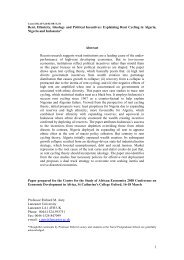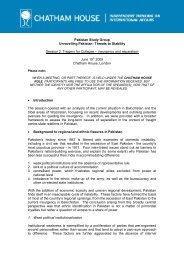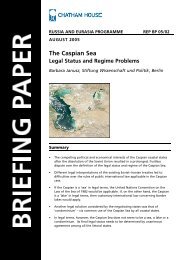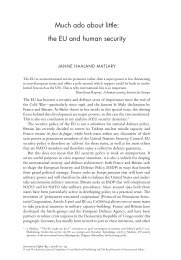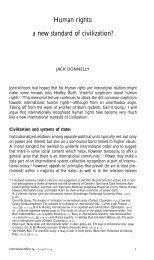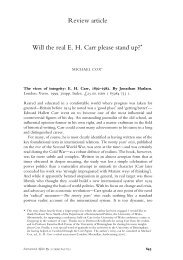The UK and European defence: leading or leaving? - Chatham House
The UK and European defence: leading or leaving? - Chatham House
The UK and European defence: leading or leaving? - Chatham House
You also want an ePaper? Increase the reach of your titles
YUMPU automatically turns print PDFs into web optimized ePapers that Google loves.
<strong>The</strong> <strong>UK</strong> <strong>and</strong> <strong>European</strong> <strong>defence</strong><br />
surely no other country could deny the necessity of cooperation. 13 On the British<br />
side, <strong>defence</strong> cuts were <strong>and</strong> are indeed one of the drivers of cooperation.<br />
In combination with the immediate need to co<strong>or</strong>dinate yet another round of<br />
<strong>defence</strong> cuts f<strong>or</strong>ced on most member states by the financial <strong>and</strong> economic crisis<br />
that began in late 2008, the bilateral Lancaster <strong>House</strong> treaties thus had the effect of<br />
stimulating a new multilateral process in <strong>defence</strong> cooperation. Building on (among<br />
other elements) a German–Swedish non-paper, the Belgian presidency creatively<br />
sidestepped the debate on PESCO <strong>and</strong> instead steered the Council towards agreement<br />
on the Ghent Framew<strong>or</strong>k (9 December 2011), prompting member states ‘to<br />
consider: measures to increase interoperability f<strong>or</strong> capabilities to be maintained on<br />
a national level; expl<strong>or</strong>ing which capabilities offer potential f<strong>or</strong> pooling; intensifying<br />
cooperation regarding capabilities, supp<strong>or</strong>t structures <strong>and</strong> tasks which could<br />
be addressed on the basis of role- <strong>and</strong> task-sharing’. Under the heading of ‘Pooling<br />
<strong>and</strong> Sharing’, this created a new dynamic in capability development. Sh<strong>or</strong>tly<br />
afterwards, at the 2011 Munich Security Conference, NATO Secretary General<br />
Anders Fogh Rasmussen announced Smart Defence, very much as a reaction to<br />
the dynamic generated in the EU, <strong>and</strong> identical to it in aims <strong>and</strong> means. 14<br />
Pooling <strong>and</strong> Sharing started the only way a collective endeavour can, potentially,<br />
w<strong>or</strong>k: as a political initiative of the EU ministers of <strong>defence</strong>. It was then up<br />
to each minister, in a top-down manner, to steer national <strong>defence</strong> planning in the<br />
direction agreed upon with his/her colleagues. In many countries, follow-up was<br />
lacklustre <strong>and</strong> the national <strong>defence</strong> apparatus was left much leeway. Predictably<br />
this was used to slow down the integrative dynamic created at the political level.<br />
This was particularly so in Germany, even though the country had been instrumental<br />
in launching the Ghent Framew<strong>or</strong>k. France <strong>and</strong> the <strong>UK</strong> were both focused<br />
on their bilateral cooperation <strong>and</strong> so they did not assume a driving role either.<br />
As Pooling <strong>and</strong> Sharing fizzled out, Smart Defence kicked in <strong>and</strong> gave new<br />
impetus to the same process in a different <strong>or</strong>ganization; but it soon went the same<br />
way. An indispensable condition f<strong>or</strong> a NATO capability project to w<strong>or</strong>k is that the<br />
US contributes, with money, personnel <strong>and</strong> equipment. <strong>The</strong>n the <strong>European</strong> allies<br />
can be persuaded to put in their share. F<strong>or</strong> the US, however, the point of Smart<br />
Defence is exactly the opposite: to persuade the <strong>European</strong>s to solve the <strong>European</strong><br />
capability problem without American supp<strong>or</strong>t. In the absence of American money,<br />
<strong>European</strong> enthusiasm f<strong>or</strong> Smart Defence began to ebb as soon as concrete projects,<br />
<strong>and</strong> budgets, had to be defined. N<strong>or</strong> did it help that the US attempted to use Smart<br />
Defence as a means of inducing <strong>European</strong>s to gain capability by buying American<br />
enablers. That might be seen as the n<strong>or</strong>mal way of things in the Atlantic-<strong>or</strong>iented<br />
capitals, but could hardly be expected to motivate those with <strong>defence</strong> industries of<br />
their own. <strong>The</strong> resulting divisions among <strong>European</strong>s made it even m<strong>or</strong>e difficult<br />
to achieve the critical mass f<strong>or</strong> any project, under either Smart Defence <strong>or</strong> Pooling<br />
<strong>and</strong> Sharing. 15<br />
13 Biscop <strong>and</strong> Coelmont, Europe, strategy <strong>and</strong> armed f<strong>or</strong>ces, pp. 80–84.<br />
14 Anders Fogh Rasmussen, ‘Building security in an age of austerity’, keynote speech by the NATO Secretary<br />
General at the Munich Security Conference, 4 Feb. 2011.<br />
15 Sven Biscop, As the EU said at the NATO summit, Security Policy Brief no. 33 (Brussels: Egmont Institute, 2012).<br />
International Affairs 88: 6, 2012<br />
Copyright © 2012 <strong>The</strong> Auth<strong>or</strong>(s). International Affairs © 2012 <strong>The</strong> Royal Institute of International Affairs.<br />
1307




